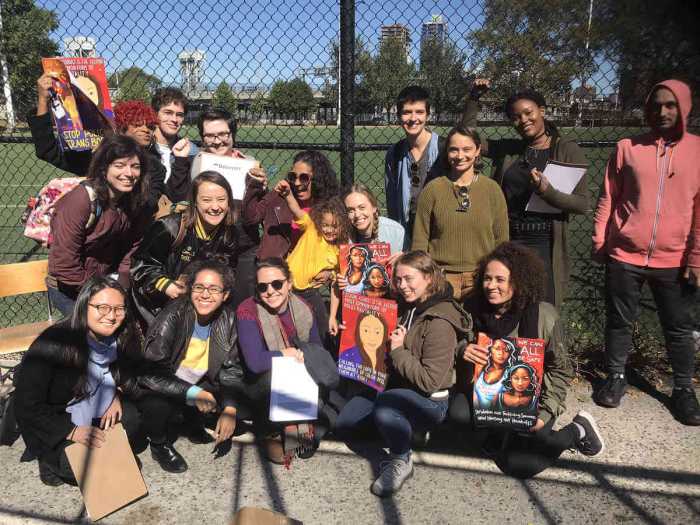US District Judge James R. Sweeney II, who was appointed to the US District Court in Indianapolis by President Donald J. Trump, issued a preliminary injunction on December 22 requiring that the Gay-Straight Alliance, or GSA (GSA also tends to stand for gender-sexuality alliance) at Pendleton Heights High School in South Madison, Indiana, be provided all the same privileges as another non-curricular club at the school, the Outdoor Adventure Club. The school argued that the Outdoor Adventure Club was a curricular club, and thus entitled not only to meet at the school but also to post notices on the bulletin boards, announce its events on the school’s radio station, raise funds for its activities, and be listed in the student handbook. Non-curricular clubs are not provided these privileges, although they can meet at the school.
The ACLU of Indiana represents the GSA in its lawsuit claiming that denial of these privileges to the GSA violates the Equal Access Act (EAA), a federal statute, as well as the First Amendment and the Equal Protection Clause of the 14th Amendment. The school, a unit of the South Madison Community School Corporation, argued that GSA was receiving equal treatment with all other non-curricular clubs at the school.
The Equal Access Act was passed in 1984, at a time when the question of whether schools could refuse to allow students to form clubs for purposes of Bible study and other religious activities was at the forefront of debate in light of Supreme Court decisions forbidding public schools to hold religious exercises as a violation of the Establishment Clause of the First Amendment. Congress chose to address the issue by requiring schools that receive federal funding not to discriminate among non-curricular student clubs. If a school decided to extend meeting and other privileges to non-curricular clubs, it could not discriminate based on the content of their lawful activities. Almost incidentally, newly emerging high school GSA’s turned out to be major beneficiaries of this protection, since the EAA was interpreted by most courts to require that schools treat GSAs the same as other non-curricular clubs.
In the early years of the EAA, there was frequent litigation around the country as public schools almost reflexively refused to allow gay student groups to function at their schools. This was, of course, a time when gay sex was illegal in many parts of the country, and school administrators would argue that they were not obliged to allow “homosexuals” to congregate at school, which might lead to unlawful activity. But courts applying the EAA mostly rejected these arguments, and after the initial flurry of litigation, school board attorneys began advising the administrators that they had to let the groups function on campus if they allowed any non-curricular groups to function.
Judge Sweeney’s decision granting the GSA’s motion for a preliminary injunction while the case is pending focused entirely on the Outdoor Adventure Club, to which the school extends all the privileges that go to curricular clubs, such as the French Club and other student clubs that directly relate to subject matter taught at the high school. The school argued that the Outdoor Adventure Club related to the physical education curriculum, but Judge Sweeney was not convinced, pointing to an early EAA ruling by the Supreme Court, Board of Education of Westside Community Schools v. Mergens, 496 US 226 (1990).
In the Mergens case, the school contended that a student scuba diving club was a curricular club, but the Supreme Court rejected the argument. The EAA requires that a club’s activities “directly relate to the body of courses offered by the school.” The Supreme Court identified four situations that would qualify: (1) if participation in the club is required for a particular course, (2) if participation results in earning academic credit, (3) if the subject matter of the club concerns the body of courses as a whole, or (4) if the subject matter of the club is actually taught, or will soon be taught, in a regularly scheduled course. Since the school in the Mergens case did not teach scuba diving or give academic credit for participating in the club’s activities, the Supreme Court said the club was non-curricular, which meant it could not be extended the privileges that the school was restricting to curricular clubs without opening up discrimination claims by other non-curricular clubs. The Court rejected the school’s argument that the club’s activities “related to” in a general way its physical education program.
In the Pendleton case, wrote Judge Sweeney, “the School’s argument is nearly identical to one the Supreme Court rejected in Mergens. The Supreme Court rejected the notion that ‘curriculum related’ means ‘anything remotely related to abstract educational goals.’” Even though the school in Mergens included swimming in its physical education program, “scuba diving was not taught in any regularly offered course at the school,” so the scuba diving club did not check any of the boxes on the Court’s checklist.
Accordingly, since the Outdoor Adventure Club at Pendleton is allowed to use the school’s bulletin boards, advertise through announcements on the school’s radio station, fundraise, and be listed in the student handbook, these privileges must be extended on a non-discriminatory basis to all other non-curricular clubs at the high school unless, of course, the school is ready to suspend these privileges for the Outdoor Adventure Club.
Judge Sweeney said it was not necessary to address the GSA’s constitutional arguments, since they were highly likely to win their argument under the EAA. Furthermore, since these privileges directly affected the ability of the GSA to communicate to the school’s students, it was causing “irreparable harm,” because the courts recognize that the loss of freedom of speech is an injury that can’t be adequately compensated after the fact by monetary damages.
Furthermore, the court found that providing these privileges to the GSA would impose no significant burden on the school and, given GSA’s concession that the school would not have to reprint the current student handbook to include them, so long as it added their listing to the on-line version, a preliminary injunction would impose so little expense that the court would waive the usual requirement that a plaintiff post a bond with the court to cover expenses incurred in complying with the injunction in case the court should ultimately rule in favor of the school on the merits of the case.
The Pendleton Height GSA is represented in this case by Indiana ACLU attorneys Kenneth J. Falk and Stevie J. Pactor.



































